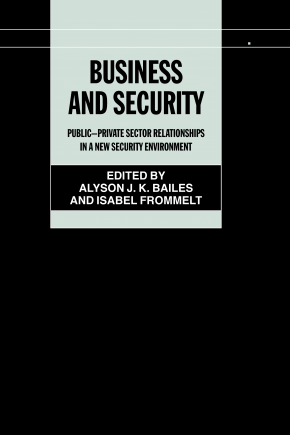Business and Security: Public–Private Sector Relationships in a New Security Environment
This book explores a broad span of issues and challenges relevant to the private–public sector security dialogue and cooperation, under six thematic headings:
- The general framework: goals and norms
- Cutting off resources for terrorism and crime: the global and European dimensions
- Business and conflict
- Preserving the legitimate economy and critical infrastructure
- The economic consequences of terrorism: can we afford to be safe?
- The security–economy linkage in a global perspective
The private business sector suffered both directly and indirectly from the terrorist strikes of 11 September 2001. Many business workers perished in the New York World Trade Center, and the insurance, transport and tourism industries were hard hit by the aftermath. Restrictions imposed in the name of security made business travel and movement of goods more complicated. The private sector was called upon to support the fight against terrorism actively with tougher controls on money transfers and on the export of dangerous materials and technologies.
These events offered a striking case of the growing interdependence of the private and public sectors in tackling present-day security challenges. The impact of the private sector, for good or ill, in areas of conflict has long been recognized. Private business is at the centre of the latest concerns over the vulnerability of crucial infrastructures, including energy supply. Systematic public–private sector consultation and partnership are needed to tackle these problems, but neither the principles nor comprehensive mechanisms for such cooperation have yet been identified.
This book is based on the proceedings of a conference on Business and Security, held at Vaduz, Liechtenstein, in September 2003. It brings together reflections on general and specific aspects of public–private sector interaction, from a variety of experts in business, government, international organizations and the academic world. For completeness and balance, it also enquires into the costs of security and includes perspectives from Africa and the Arab world. It offers new reference material to help in the further exploration of this important subject.
Introduction. Business and security: Public–private sector interface and interdependence at the turn of the 21st century
Alyson J.K. Bailes
Part I. The general framework: Goals and norms
Editor's remarks
1. Security and the responsibilities of the public and private sectors
István Gyarmati
2. Public–private sector cooperation
Erik Belfrage
3. What price values?
Daniel Tarschys
Part II. Cutting off resources for terrorism and crime: The global and European dimensions
Editor's remarks
4. An international response to terrorism
Claes Norgren
5. Counter-terrorism measures undertaken under UN Security Council auspices
Thomas J. Biersteker
6. Strategic export controls and the private sector
Evan R. Berlack
7. The European Union: New threats and the problem of coherence
Niall Burgess and David Spence
8. Banking in an international and European framework: The case of Liechtenstein
Georges S. Baur
9. The resources and tactics of terrorism: A view from Russia
Vadim Volkov
Part III. Business and conflict
Editor's remarks
10. Business investment, humanitarian problems and conflict
John J. Maresca
11. Conflict diamonds: The De Beers Group and the Kimberley Process
Annex 11A. The Kimberley Process Certification Scheme
Andrew Bone
12. Oil and conflict: Lundin Petroleum's experience in Sudan
Christine Batruch
13. The role of humanitarian organizations: The case of the International Committee of the Red Cross
Gilles Carbonnier
Part IV. Preserving the legitimate economy and critical infrastructure
Editor's remarks
14. The security of business: A view from the security industry
Crispin Black
15. Survival planning for business: A view from Nokia
Urho Ilmonen
16. Defending against cyber terrorism: Preserving the legitimate economy
Olivia Bosch
17. The concept of critical infrastructure protection
Jan Metzger
18. Critical energy system infrastructure protection in Europe and the legitimate economy
Kevin Rosner
Part V. The economic consequences of terrorism: Can we afford to be safe?
Editor's remarks
19. The economic consequences of terrorism
Patrick Lenain
Part VI. The security–economy linkage in a global perspective
Editor's remarks
20. A view from the League of Arab States
Saad Alfarargi
21. A view from Africa
Said Adejumobi
Annex. A comment on immigration controls and education in the United States
Phyllis O. Bonanno
Appendices
Editors' remarks
Appendix 1. Institutions in the field of security, active or interested in the public-private sector interface: Government and international institutions, academic and research bodies, and non-governmental organizations
Isabel Frommelt
Appendix 2. Private-sector organizations and institutions, active or interested in the field of security
Isabel Frommelt
Appendix 3. Select bibliography
Isabel Frommelt


